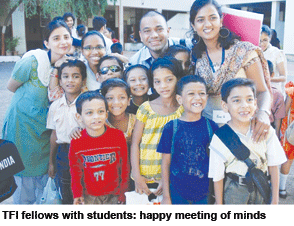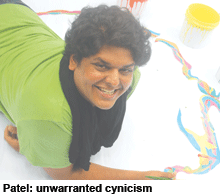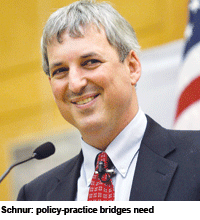Over the past three years, the Mumbai-based Teach For India programme, whose objective is to eliminate educational iniquity in India by cherry-picking outstanding graduates and professionals to teach in low-income schools, has placed 506 fellows in 164 municipal and private budget schools in five cities. Matthew Schneeberger reports
 Prasid Sreeprakash (25) is from a middle class family in Kerala, scored 99.86 percent in the super-tough Common Admission Test of the IIMs and graduated from the premier Indian Institute of Management-Indore. Typically with this prized qualification, Sreeprakash should have landed a job in a company of his choice with a six figure monthly salary as most of his batchmates at IIM-Indore did. Instead Sreeprakash signed up with Teach For India (TFI), a Mumbai-based NGO which pays Rs.16,000 per month.
Prasid Sreeprakash (25) is from a middle class family in Kerala, scored 99.86 percent in the super-tough Common Admission Test of the IIMs and graduated from the premier Indian Institute of Management-Indore. Typically with this prized qualification, Sreeprakash should have landed a job in a company of his choice with a six figure monthly salary as most of his batchmates at IIM-Indore did. Instead Sreeprakash signed up with Teach For India (TFI), a Mumbai-based NGO which pays Rs.16,000 per month.
Twelve-year-old Asira Sheikh’s father earns less than Rs.1 lakh in an entire year. Asira is a class IV student of the pathetically under-resourced Varsha Nagar BMC (Brihanmumbai Municipal Corporation) School in Vikhroli, Mumbai, which draws its student body from neighbouring slums. Normatively, attending a BMC primary would have condemned her to a rudderless, rote memorisation-driven education delivered in the vernacular Marathi or Urdu languages by unmotivated, inadequately trained teachers — to a life marred by unrealised academic potential. Instead Asira and her 30 classmates study a joyful, holistic, practical, and skills-based curriculum taught in English by Prasid Sreeprakash.
This happy meeting of minds has been enabled by TFI whose objective is to eliminate educational iniquity in India by cherry-picking outstanding graduates and professionals to teach full-time for two years in low-income schools. Since it was registered in December 2008, and three and a half years after it placed its first batch of 80 ‘fellows’ (teachers) in 33 low-income schools in Mumbai and Pune, TFI has recruited and deputed 506 fellow graduates from India’s most admired higher education institutions to teach in 164 municipal and private budget schools in five cities (adding Pune, Delhi, Chennai and Hyderabad), with plans to place 2,000 fellows in under-served schools by 2016-2017. Although there’s little extant empirical research of the learning outcomes of the 15,000-plus students who’ve learned in TFI-enabled classrooms, ample anecdotal evidence underscores the enabling power of TFI teachers.
For instance, last December Asira presented a detailed model of the solar system to a group of adults at the American School of Bombay, an elite international school located in the Bandra-Kurla Complex. Not intimidated by the unfamiliar environment of the well-equipped school, Asira spoke confidently (in English), displaying the aptitude and intellectual curiousity necessary for a career in science, her dream profession.
This symbolic victory — for Asira as a student, Sreeprakash as an educator and TFI as an organisation — was replicated in similar TFI student exhibitions on ethics, phonics, visual art and mathematics at the third annual inspirED conference held in Mumbai on December 8-9. Organised by TFI, the two-day education conference attracted 500-plus delegates, including school teachers and principals, and repres-entatives from foreign and domestic NGOs, think tanks, education start-ups and large business corporations.
Led by pioneering American education reformer Jon Schnur, executive chairman of America Achieves and co-founder and former CEO of New Leaders, who worked in the 1990s for then US President Bill Clinton and more recently President Barack Obama, the 50-strong roster of speakers at InspireED featured experts like Craig Johnson (superintendent, Bombay International School), Ajit Rangnekar (dean, Indian School of Business), Shukla Bose (founder-CEO, Parikrma Humanity Foundation), Ankur Sarin (faculty, IIM-Ahmedabad), Ramya Venkataraman (head, education prac-tices, McKinsey & Co India) and Amit Chandra (managing director (India) Bain Capital Private Equity), among others. They led interactive, topically diverse sessions focusing on the causes and effects of education iniquity at three levels — in classrooms, schools and the overarching system — and prescribed innovation, leadership and partnership for transformational solutions.
Implicitly, this appeal for increased participation and collaboration from such a broad spectrum of individuals and organisations at the inspirED convention acknowledged that iniquity is too deeply entrenched in the Indian education system for one NGO to tackle from ground up. The landmark Right to Free and Compulsory Education Act, 2009 (aka RTE Act), which guarantees all children between the ages of 6-14 free and compulsory education and came into force on April 1, 2010, is yet to make any perceptible impact despite the three-year implementation deadline expiring at the end of this month (March 31).
Among the Act’s many objectives which remain unattained is one mandating minimum qualifications for new and in-service primary school teachers. Currently one in five primary school teachers lacks the stipulated minimum academic qualifications, and the RTE Act requires the Central and state governments to conduct teacher eligibility tests. In the inaugural Central Teachers Eligibility Test (CTET) conducted in 2011 by the National Council for Teacher Education, 86 percent of teachers who wrote the test failed. In 2012 the percentage of failed teachers increased to 94 percent with 99 percent of teachers with B.Ed quali-fications flunking CTET — an indication of the pathetic quality of education dispensed by the country’s 6,076 B.Ed colleges.
The dismal standards of teacher education countrywide was confirmed in 2012 by the Supreme Court-appointed J.S. Verma Committee which opined that the overwhelming majority of the country’s B.Ed colleges dispense poor quality education and training. For example in Maharashtra, of the 291 B.Ed colleges inspected, only 34 met stipulated quality norms. If this isn’t bad enough, there’s a looming teacher shortage crisis with 1.2 million additional teachers required to successfully implement the RTE Act.
 Given this monumental human resource challenge confronting the Indian school system, the TFI top management is well aware that its fellows (ironically even though they are better qualified than the average government primary school teacher, since the RTE Act mandates a two-year teacher training qualification as a requirement, ‘fellows’ can’t be formally employed as ‘teachers’) contracted to serve for two years, can make only a nominal difference. Yet its hope is that when TFI fellows enter high-profile careers after two years of teaching underprivileged children, they will become champions of education, change agents and life-long advocates of quality education for the underprivileged sections of society. Therefore TFI measures its impact and growth not by the size of its fellowship programme, but by the positions of influence its carefully selected fellows will attain later — an organisational lynchpin borrowed from Teach For America, the US-based NGO with which TFI is affiliated.
Given this monumental human resource challenge confronting the Indian school system, the TFI top management is well aware that its fellows (ironically even though they are better qualified than the average government primary school teacher, since the RTE Act mandates a two-year teacher training qualification as a requirement, ‘fellows’ can’t be formally employed as ‘teachers’) contracted to serve for two years, can make only a nominal difference. Yet its hope is that when TFI fellows enter high-profile careers after two years of teaching underprivileged children, they will become champions of education, change agents and life-long advocates of quality education for the underprivileged sections of society. Therefore TFI measures its impact and growth not by the size of its fellowship programme, but by the positions of influence its carefully selected fellows will attain later — an organisational lynchpin borrowed from Teach For America, the US-based NGO with which TFI is affiliated.
“Teach For India is based on a two-part theory of change: the first part is a teaching fellowship which is a training ground for leadership and commitment, and the second part is the alumni movement. We select our brilliant fellows in the hope and expectation that in 10-15 years, after serving with TFI, they will be in positions of power and authority to meaningfully impact children’s lives. The intermediate vision is to create exemplars, because today there aren’t even examples of excellent schools for the poorest children. Currently, we have just 200 alumni, from our first two batches. But it’s encour-aging that 60 percent of them have stayed on to work full-time in education. And the other 40 percent are determined to positively impact public education from within workplaces and vocations. This is the hope and expectation of TFI,” says Shaheen Mistri, CEO and founding board member of Teach For India.
A high achiever with degrees from top international universities, Mistri’s own life story is of an individual who — much like the TFI fellows — gave up the opportunity to pursue a profitable career to promote the cause of educa-tion. Daughter of a Citigroup banker, Mistri had an affluent upbringing in more than ten countries, including Greece, Lebanon, America and Indonesia, studying at the exclusive US boarding school Greenwich Academy in Connecticut.
In 1989 she was enroled in an undergraduate programme in Tufts University, when while on holiday in Mumbai, she walked into one of the city’s infamous slums and was greatly moved by the plight of neglected children. Dropping out of Tufts, Mistri enroled for a sociology undergrad degree programme at St. Xavier’s College, and began educating under-privileged children. Two years later in 1991, she formally registered the Akanksha Foundation, pioneering the idea of using vacant classrooms of main-stream schools, colleges, and offices after work hours as learning centres.
Since then Akanksha, which began as a single supplemental after-school programme for students from failing government and municipal schools, has evolved into one of India’s most respected NGOs running 40 learning centres in Mumbai and Pune. Moreover, the foundation has also promoted its own schools for the underprivileged, where a holistic curriculum focused on critical thinking and life-skills education is dispensed. Currently Akanksha runs 13 free-of-charge primary schools, also in Mumbai and Pune, with an aggregate enrolment of 2,000-plus children.
Her almost two-decades experience at Akanksha not only helped Mistri, who also took time off in-between to pursue a postgrad degree in education from UK’s Manchester University (1993), hone her organisational manage-ment and fund-raising skills, she also learnt what it takes to turn failing schools around. By the mid-2000s, Mistri began researching ways and means to replicate child-by-child victories on a national scale, which led to her interest in Teach For America (TFA), a US non-profit organisation founded in 1989 by Wendy Kopp, an alumna of Princeton University. In her final year thesis at Princeton, Kopp developed the Teach For America model — recruit high-achieving university graduates to teach for at least two years in low-income schools, who subsequently become champions of school education throu-ghout their professional lives. Kopp’s expectation was that some TFA fellows would get hooked to education to serve as teachers, principals, consul-tants and bureaucrats, while others who mainstreamed as bankers, artists, lawyers, doctors, politicians, and journ-alists, would create a vast network of motivated professionals prepared to use their skills to fight educational iniquity and exclusion, from their positions of clout. Currently, TFA supports 10,000 fellows in 46 urban and rural American communities and has ‘graduated’ 30,000 alumni.
Mistri saw promise in adapting the TFA model to India and in 2006 reached out to Kopp for support and guidance, prompting her to take a week-long reconnaissance trip to Mumbai. The timing was perfect because the 15-year-old TFA was ready to take its tried and tested model abroad through its Teach For All initiative, an affiliation of NGOs in several countries committed to using the Teach For America model.
 Feasibility studies undertaken pro bono by McKinsey & Co in the US and locally, confirmed that India could successfully participate in the global Teach For All network, and in 2008 Teach For India was registered as a not-for profit with Mistri as its CEO, and seed funding ($2.5 million or Rs.13.5 crore) from the Michael & Susan Dell Foundation. Anu Aga, former executive chairperson of the Pune-based Thermax Group, accep-ted Mistri’s invitation to chair TFI’s board of directors. Subsequently several heavyweights from industry and education including Nisa Godrej (Godrej Industries); Nita Ambani (Relia-nce Foundation); Deepak Satwalekar (HDFC Standard Life Insurance), Ashish Dhawan (ChrysCapital), and S. Ramadorai (former CEO of Tata Consultancy Services) were inducted onto the board.
Feasibility studies undertaken pro bono by McKinsey & Co in the US and locally, confirmed that India could successfully participate in the global Teach For All network, and in 2008 Teach For India was registered as a not-for profit with Mistri as its CEO, and seed funding ($2.5 million or Rs.13.5 crore) from the Michael & Susan Dell Foundation. Anu Aga, former executive chairperson of the Pune-based Thermax Group, accep-ted Mistri’s invitation to chair TFI’s board of directors. Subsequently several heavyweights from industry and education including Nisa Godrej (Godrej Industries); Nita Ambani (Relia-nce Foundation); Deepak Satwalekar (HDFC Standard Life Insurance), Ashish Dhawan (ChrysCapital), and S. Ramadorai (former CEO of Tata Consultancy Services) were inducted onto the board.
“Our first formidable challenge was to find idealistic college graduates who would be willing to work in low budget schools to help disadvantaged children bridge the learning gap. Most youth hadn’t heard of Teach For America or its work and were unfamiliar with the concept of a gap year, let alone two. Therefore it was quite a challenge to persuade our first batch of 80 graduates, postgrads and working professionals to put their careers on hold and work in education,” recalls Gayatri Nair Lobo, TFI’s senior director (strategy and development). An alum of Mumbai University who started her career with HDFC Bank followed with Avalon Consulting and OC&C Strategy Consultants (London), Lobo provided an example by signing up with TFI in 2009.
However these fears proved unfounded. A modest marketing campaign directed at India’s premier colleges and corporates attracted 1,800 applications belying widespread cynicism about the idealism of India’s educated middle class youth. “Now TFI recruitment teams travel to hundreds of colleges in each state of India and in the US and Europe. We attach great value to diversity, and recruit from engineering, arts, business, journalism and law schools besides B.Ed colleges. The response is quite encour-aging with large numbers of IIM, IIT, BITS Pilani, NIT, St. Xavier’s College, Mumbai and Delhi University grads and even postgraduates responding,” says Jeet Patel, a graduate of the blue-chip Northwestern University, USA, who served as a Teach For America fellow for three years, followed by a two year-stint with TFA in teacher training before returning to India and signing up with TFI, and is now director of recruitment.
 Once selected, TFI fellows are put through an intensive five-week teacher training programme in Pune after which they are deputed to a city of their choice and placed in a government or low-budget private school. The remuner-ation package is modest — Rs.16,000 per month, health insurance plus a variable housing allowance. Despite this, TFI has received over 11,000 applications for 480 vacancies this year (2013). Moreover in a surprisingly encouraging development, 60 percent of the 283 fellows recruited in 2012 were working professionals, indicating that there’s no dearth of idealism in India Inc either, though this mid-career teaching sabbatical is often subsidised by a few top corporates who’ve partnered with TFI. And with TFI lifting its 35 years of age ceiling for applicants this year, the number of working professionals apply-ing for fellowship positions is set to soar.
Once selected, TFI fellows are put through an intensive five-week teacher training programme in Pune after which they are deputed to a city of their choice and placed in a government or low-budget private school. The remuner-ation package is modest — Rs.16,000 per month, health insurance plus a variable housing allowance. Despite this, TFI has received over 11,000 applications for 480 vacancies this year (2013). Moreover in a surprisingly encouraging development, 60 percent of the 283 fellows recruited in 2012 were working professionals, indicating that there’s no dearth of idealism in India Inc either, though this mid-career teaching sabbatical is often subsidised by a few top corporates who’ve partnered with TFI. And with TFI lifting its 35 years of age ceiling for applicants this year, the number of working professionals apply-ing for fellowship positions is set to soar.
Currently TFI has a contingent of 500- plus fellows in five cities whose stipends are paid out of an annual budget of Rs.20 crore raised from several charities, foundations, corporations, individuals and fundraising events. Big donors include Godrej Group, the Omidyar Network, Ruane Cuniff, Credit Suisse, Bank of America, JP Morgan, Thermax Social Initiatives Foundation, Sir Ratan and Sir Dorabji Tata trusts. Inevitably, given the rising swell of fellows, fundraising is a top priority function at TFI, occupying a four-member team led by Gayatri Nair Lobo (quoted earlier) full-time. “When we reach our target of 2,000 fellows in 2016-17, we will need to raise Rs.100 crore, an intimidating but not impossible target,” says Lobo, adding that TFI spends only 14 percent of its budget on non-salary heads such as HR, communications and technology.
Though fundraising and recruiting efforts have been fairly successful, TFI has failed to hit initial growth targets outlined in a 2007 Teach For All press release, which stated that by 2013 TFI aimed for 2,000 fellows in a dozen communities, a goal that’s now been pushed to 2016-2017. A major problem is that TFI is entirely dependent upon private philanthropy and donations. In this respect its development model differs from its American counterpart (TFA). In the US as well as in the majority of 27 other countries worldwide in which the Teach For All initiative is being implemented, the federal and/or state governments pay fully/partly the salaries of teachers recruited by TFA and its clones.
So while 164 municipal and private budget schools in five cities have welcomed highly-qualified TFI fellows as ‘additional’ teachers, they are either unable and/or unwilling to pay for their services. With the RTE Act mandating minimum two-years of formal teacher training as a pre-condition for employing primary-secondary teachers, ‘uncertified’ TFI fellows are ineligible to receive any government funding and the NGO has to pay their full salary and perquisites.
Zero government funding for services rendered apart, TFI fellows face several in-school problems once they start teaching. Almost uniformly, school managements in India favour rote-memorisation, exam-centric and fear-based pedagogies, which are in direct conflict with TFI’s specially designed holistic curriculum which emphasises critical thinking, life skills education and provision of after-school academic and emotional support to students. Compo-unding the discrepancies between these two approaches, TFI fellows operate inside low-income schools plagued by acute human and material resource shortages, and teach students whose impoverished and dysfunctional home lives adversely impact learning outcomes.
Comments Kate Rapisarda an alumna of Yale University and former Teach For America staffer prior to signing up with TFI, and now serving as Mumbai city director: “Low-income schools provide minimal support to students outside classrooms. As a result our fellows are obliged to take on far greater responsibilities than I ever did as a teacher in the US. In the school I taught in Denver, we had a full time counselor, a nurse and a host of other support staff for students with special needs. None of that support exists in schools here, so our teachers need to balance multiple roles.”
Thus, in addition to full-time teaching, fellows discharge the duties of physician, psychiatrist, elder sibling and social worker. Hoping to delegate some of these wearying responsibilities, TFI has partnered with NGOs and organisations which provide counseling and support services, but ultimately the onus of student well-being rests primarily on the shoulders of individual TFI fellows, whose extraordinary efforts, invested both inside and outside the classroom, are starting to pay off. According to TFI internal assessment (2010-11), the learning outcomes of TFI students — most of whom began the term between two and four years behind standard achievement — improved by an average 1.7 years in grammar, 1.4 years in writing, 1.2 years in speaking and listening, 1.1 years in reading fluency, 1 year in reading comprehension, and 1.2 years in mathematics. School attendance also increased from 81 to 89 percent.
The steady growth and progress of TFI over the past five years is subst-antially attributable to the excellent top management team Mistri has put together. Graduates of top British and American universities, TFI’s apex-level managers have exhibited rare passion, integrity and commitment to get the NGO off to a flying start. Combining their own excellent education in top American universities with hands-on experience in not-for-profit NGOs and corporate enterprises, they have developed proc-esses and practices which ensure speedy project implementation, docum-entation of work, efficient internal and external communication and concerted outreach and branding initiatives.
For instance, the annual TFI inspirED conference brings all stakeholders in school and higher education on one platform to brainstorm about solutions. “In the first two years — 2011 and 2012 — inspirEd focused mainly on teacher specific issues. This year the sessions were more diverse and addressed classroom, school and systemic reform. InspirEd’s main objectives are to share innovative best practices in education, make teaching an aspirational career choice, build a professional learning community of educators and help individuals identify the roles they can play in tackling educational iniquity,” says Madhumita Subramanian, an economics graduate of Warwick University, UK who was a fellow in TFI’s inaugural batch of 2009, and is currently the NGO’s events manager.
 Another high-potential initiative which TFI is enabling is the India School Leadership Institute (ISLI). A partnership between Akanksha Found-ation, the Central Square Foundation, and TFI, supported by US non-profit KIPP, ISLI was launched on January 16 in Delhi with the objective of training school leaders to deliver high-quality education to children of disadvantaged comm-unities. “The objective is to build a movement of high-quality schools for children from disadvantaged communities and also create a space where school leadership is acknowledged as a unique and challenging profession distinct from teaching. ISLI aims to set standards for quality school leadership development in India,” says Vandana Goyal, an economics graduate of Claremont McKenna College, USA who signed up with Akanksha Foundation in 2006 and was appointed CEO in 2010.
Another high-potential initiative which TFI is enabling is the India School Leadership Institute (ISLI). A partnership between Akanksha Found-ation, the Central Square Foundation, and TFI, supported by US non-profit KIPP, ISLI was launched on January 16 in Delhi with the objective of training school leaders to deliver high-quality education to children of disadvantaged comm-unities. “The objective is to build a movement of high-quality schools for children from disadvantaged communities and also create a space where school leadership is acknowledged as a unique and challenging profession distinct from teaching. ISLI aims to set standards for quality school leadership development in India,” says Vandana Goyal, an economics graduate of Claremont McKenna College, USA who signed up with Akanksha Foundation in 2006 and was appointed CEO in 2010.
The commitment, dedication and organisational achievement of TFI’s top management team have impressed knowledgeable educators abroad, even if not in India. Jon Schnur, the co-founder and executive chairman of America Achieves, a New York City-based non-profit which promotes nationwide education reform in nume-rous ways, who delivered the keynote address at InspirED Mumbai 2012, believes TFI has got off to a good start and — much like TFA in the US — has the potential to significantly influence Indian education.
 “To make sustained impact, TFI must first stick with its model for the long term; secondly it will need to examine evidence of what’s working and what’s not and modify its strategies accord-ingly; and third, it will have to continue to recruit dedicated, outstanding leaders and fellows over the next several years to achieve success on a national scale. Substantive reform will require a blend of policy changes and classroom and school-driven excellence and innovation — and bridges built between policy and practice. TFI seems to be tackling these fronts,” says Schnur, who helped conceptualise the Obama adminis-tration’s Race to the Top contest, which disbursed $4.35 billion (Rs.23,490 crore) to schools which introduced major innovation and reforms.
“To make sustained impact, TFI must first stick with its model for the long term; secondly it will need to examine evidence of what’s working and what’s not and modify its strategies accord-ingly; and third, it will have to continue to recruit dedicated, outstanding leaders and fellows over the next several years to achieve success on a national scale. Substantive reform will require a blend of policy changes and classroom and school-driven excellence and innovation — and bridges built between policy and practice. TFI seems to be tackling these fronts,” says Schnur, who helped conceptualise the Obama adminis-tration’s Race to the Top contest, which disbursed $4.35 billion (Rs.23,490 crore) to schools which introduced major innovation and reforms.
Five years on, Teach For India is stable and growing. But to achieve its long-term goal of eliminating iniquity in Indian education, it faces a multi-decades battle against deeply entrenched, fundamentally inegalitarian forces, such as a cynical citizenry, an unaccountable bureaucracy, antiquated education policy and staggering demographic challenges. To win this battle, TFI’s alumni army will need ammunition, which is why the group’s current aim is to create and illuminate examples of anecdotal success, to be used as powerful references during future debates on education reform.
“The past five years have been a valuable institution-building and learning experience for TFI. Now, going forward, our goal is to build exemplars of excellence: high-achieving low-income schools, holistic curriculum models and innovative learning assessment methods. We expect our alumni to join and reform institutions in these prioritised areas. Then, post-five years, hopefully we’ll have enough of those examples to think about scaling and addressing the national question, because we need models of excellence which can be invested in, rolled out and scaled up by the Central and state governments. We also need to create alternative teacher accreditation path-ways and exceptional teacher training and school leadership institutes, so that the country’s top graduates will aspire to become teachers and/or champions of education. Also it’s important to encourage public discussions and debates about education, so that policy makers and politicians appreciate the value of education reform and have a reason to invest in it. The auguries are good. Ten years ago no one was talking about education reform. Today there’s a buzz about it. These are positive signals,” says Mistri.
Undoubtedly the issue of education reform, particularly the challenge of delivering quality education to the overwhelming majority of the contemporary world’s largest child population, has moved from the periphery to the near centre of the national development debate. And TFI’s achievement of persuading 480 of the country’s best and brightest graduates from premier institutions such as the IITs and IIMs and professionals from blue-chip corporates to put their careers on hold and commit two years to teaching children in low-income schools, points towards a better future for Indian education. As does TFI’s evolution over the past five years from a fellowship programme to an advocacy organisation developing holistic curriculums and high-achieving schools for the under-privileged while promoting teaching as a career option.
And perhaps most important, it has graduated education-sensitive professi-onals who will undoubtedly use their positions of power in the media, business, and politics to stimulate reform and excellence in Indian education.
With Summiya Yasmeen